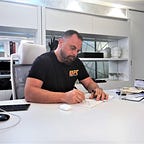Practical ways to think about self-development and personal development | Joseph Tabet
What does self-development and personal development really mean in practical terms?
The terms ‘personal development’ and ‘self-development’ are often used interchangeably. Often, they mean different things to different people.
But whichever term you prefer, it’s important to continue the journey of self-development throughout your life. So, what does that mean in practical terms for your work and home life?
Self-development is a lifelong journey
For me, personal development is a continuous process. No matter my achievements or my level of success in business and with family life, I never stop progressing. It’s about taking the time to assess your qualities and skills periodically.
Are you achieving your aims? Does your work life match your goals? In order to reach your full potential, it is important not to lose yourself in the routine of life. Personal development isn’t just about your career, of course.
Whether you’re a business leader exceling in your field, or an entrepreneur disrupting an industry sector, life should be about balance. And that means finding a way to develop your inner self to match your outer self.
Personal development needs sustained effort
Positive and effective life choices, reflective and considered decisions, and judicious strategic risk taking combine to equip you with the personal development skills you need.
And while our early formative experiences and the experiences of our childhood do partly shape our future success as an adult, personal development will continue to do so as well.
Let’s look at why self-development and personal development are so important.
You’re aiming for self-actualisation
Theories, ideas and explanations abound about personal development. There are many out there, and I would recommend Dr Joe Dispenza for a great starting point.
One of the accepted theories surrounding self-development is called ‘self-actualisation’, a term coined by US psychologist Abraham Maslow as the final pillar of his Hierarchy of Needs.
In 1970, Maslow posited the theory that everyone has an innate need for personal development. This process happens through something he calls self-actualisation. His Hierarchy of Needs is a linear process in which each level of need has to be satisfied before you can develop the next. Of course, as our lives progress, the underlying need that motivates our behaviour also changes.
The Hierarchy of Needs
Self-actualisation is the top level of the Hierarchy of Needs. It’s where your full potential has been realised and you are everything that you can be.
Underneath self-actualisation come the other needs that drive our behaviour:
- Aesthetic needs — for design, creativity, beauty and art.
- Cognitive needs — the need for knowledge and to understand, meaning and predictability.
- Esteem needs — self-esteem and self-respect as well as the respect from others, including at work and from family.
- Love and belonging — feeling part of a group, including family and at work and for love, belonging and acceptance.
- Safety needs — feeling safe from danger, including psychological and physical danger, routine, money, health and work security.
- Physiological needs — these are the most basic needs of shelter, food, oxygen, water, sleep and relaxation, activity, sex and exercise.
According to Maslow in his 1970 book Motivation and Personality, self-actualisation means self-fulfilment. And to get there, you need to be deeply in touch with your feelings and your inner self and live life with concentration.
Some ways you can manage your self-development and personal development
Below are some of the steps I take to manage my own personal development. There is no one way to reach self-actualisation, but these will give you some ideas of where to start.
Of course, you can set about a path of self-development just for fun, but if you have an end goal, it’s much easier to find the motivation to improve. Start with your own personal vision. Think about where you want to be in ten years, then five, then six months. Consider why you want to be there — ‘why’ is a very important part of the development of your own vision.
When you know your goal and where you want to be, you need to start planning. This isn’t essential, but I do recommend it as it makes everything more attainable and visual.
This is where you need to seek out some assistance — it could be a course, a degree, a reading programme or finding a mentor. For me personally, Joe Dispenza has been integral in my journey towards self-actualisation. For you, it could be someone totally different. Expand your sources and read as much as you can. All of this will help you along the way.
Keeping a record of your progress is a good plan. Writing down your achievements and important developments when they happen will help you look back and understand your progress later on.
It’s very motivational to keep records of your skills as they develop — so whether it’s via a journal or other method, consider how best to record your journey.
Check out my blog on self-development in business for more.
Originally published at https://www.josephtabet.com on February 12, 2022.
